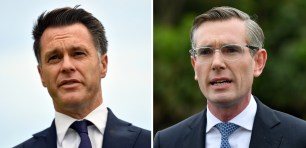
NSW Labor leader Chris Minns (AAP Image/Mick Tsikas)
An independent assessment of NSW Labor’s election promise to raise public sector wages and pay for it with “productivity gains” has found the plan would cost $2.6 billion over three years.
The cost analysis from the Parliamentary Budget Office on Monday afternoon came just hours after Labor Leader Chris Minns guaranteed public sector workers would get a pay rise above 3.5% if his party won government on Saturday: “I can guarantee that as a result of the fact that we know that there’s budget savings and productivity gains with our strict economic rules in place.”
Minns had previously declined to say that wages would increase, even though a central part of his party’s platform is to scrap a cap on public sector wages imposed by the current government. As recently as last week he would only go so far as to say wage increases would be “negotiated” under a Labor government.
The PBO analysis looked at a “hypothetical example” of a one percentage point increase above the government’s wage growth targets of 4% for the next financial year, and 3.5% in the following years. It found a Labor government would have to identify “cumulative productivity savings of $2.6 billion over three years” to pay for the increase.
“It is not possible to give public sector workers a pay rise without it impacting the budget bottom line — the numbers simply don’t add up,” Treasurer Matt Kean said. “Chris Minns is either lying to workers or he’s lying to his union mates. The risk is clear that he could also be forced to either cut services or sack workers.”
In its analysis of the Coalition’s election promises, the PBO found that many big-ticket items floated during the election had not been submitted for costing. Labor seized on that in reacting to the PBO release on Monday evening.
“Extraordinarily, there is no new money in the Liberals’ costings for the construction of the two metro projects it promised,” it said. “Nor is there money for Warragamba Dam wall raising. And the northern beaches link also remains unfunded.”
A Labor campaign spokesman said the party’s policy would not affect the budget position: “We’ve said from day one that we want to be responsible when it comes to essential services in NSW — and what we can pay our teachers, nurses, paramedics and cops will be based on the budget rules we have laid out.
“Any increase to wages will have to be paid for out of productivity gains and budget savings.
“There are independently costed policies on training, conditions and the wages cap — to keep our cops, teachers, paramedics and nurses here in NSW, not moving elsewhere. No other state has a wages cap in place in the entire country.”
The Coalition did not respond to follow-up questions from Crikey.
Other parts of the PBO analysis found Labor’s election promises would improve the net operating budget over the next four financial years by $1.4 billion, compared with a $97.2 million improvement over the same period under the Coalition plan, a $1.3 billion difference.
In another development, the PBO was forced to issue a correction to its Monday release because a “production error” had caused the first version to claim net borrowing would increase under the Labor plan, and decrease under the Coalition plan. The opposite was true.
The PBO told Crikey it issued its costings at 2.06pm, and discovered the error within one hour.
“We discovered the mistaken text within the hour, and corrected it in the versions published on the PBO website,” Parliamentary Budget Officer Stephen Bartos said.
The correction was issued at 3.52pm.
This article was first published on Crikey.
Handpicked for you

Not just sheer luck: The role of pokies in deciding NSW elections



COMMENTS
SmartCompany is committed to hosting lively discussions. Help us keep the conversation useful, interesting and welcoming. We aim to publish comments quickly in the interest of promoting robust conversation, but we’re a small team and we deploy filters to protect against legal risk. Occasionally your comment may be held up while it is being reviewed, but we’re working as fast as we can to keep the conversation rolling.
The SmartCompany comment section is members-only content. Please subscribe to leave a comment.
The SmartCompany comment section is members-only content. Please login to leave a comment.